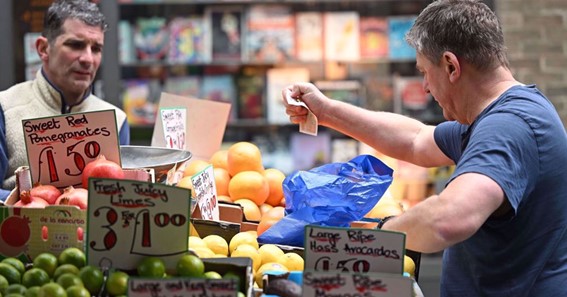Despite the UK’s high inflation, many put off putting on the heat.
Prices increased at their fastest rate in September in 40 years as a result of mounting financial pressure, according to a MEDIANWIRE study.
Along with increases in energy prices and transportation expenses, the cost of cereal, milk, and cheese also increased.
As opposed to 69% in a comparable poll conducted in January, over 85% of those surveyed are now concerned about the growing expense of living.
As a result, 90% of individuals put off turning on the heater in an effort to save money.
According to today news and study of 4,132 people, the main concerns regarding cost increases are the growing prices of food, gasoline, and energy.
In the Savanta comres study conducted for the MEDIANWIRE, over 50% of respondents indicated that their household’s energy costs had increased significantly.
In the previous week, nearly nine out of ten of those surveyed had turned off the lights and electrical equipment that was on standby.
The study was done earlier this month before Chancellor Jeremy Hunt revoked certain tax cuts, declared that some people would only receive limited relief for their energy costs, and forewarned of additional budget cutbacks.
However, more than half of those surveyed (56%) believe their financial situation would deteriorate during the following six months. In January, it was 30%.
When questioned, two-thirds of renters indicated it had been challenging to pay for necessities in the previous six months. Similar percentages of respondents agreed that the government’s assistance was insufficient to help individuals cope with growing living costs.
The cost of living increased by 10.1% in the year ending in September, which is the quickest rate in 40 years and is mostly due to high price increases in the cost of food and energy.
Following Russia’s invasion of Ukraine, which interrupted production and exports and raised costs at supermarket checkouts, food and energy prices have been rising globally.
From September 2021 to September 2022, according to the Office for National Statistics.
The UK state pension increase and various other benefits are typically calculated using the inflation rates from September. It’s not clear if the administration still plans to follow this course of action or if it will reduce spending by raising payments by a smaller amount and tying the rise to earnings instead.
In the past six months, paying for necessities has already proven challenging for over half (52%) of UK adults’ households.
According to world news of MEDIANWIRE poll, people are altering their spending patterns to help them manage. They are spending less on clothing for themselves and their kids, going on fewer day excursions, and making fewer journeys to see relatives or friends.
Additionally, many are delaying major expenditures like remodeling their houses or getting a new TV, couch, or automobile.
Two-thirds of UK individuals who are concerned about the expense of living also claim that this is negatively affecting their mental health.
Naomi Naylor, a Durham resident, is in her third year of paramedic school at the University of Sunderland. She is concerned about how increasing gas prices would affect her budget.
Since 75 percent of North East workers often drive to work, rising fuel costs can have a significant impact on individual budgets.
Every day, I commute in and out since it is less expensive than staying home. My largest expense right now is gasoline; it’s costing me more than it used to.
The 21-year-old claims that she and the majority of her pals intend to remain in the region, but because there is competition for graduate paramedic jobs, some may have to travel further afield for employment.
This may increase their trip expenses even further, which would only increase her worries.
The assistance to prevent home energy bill increases was reduced from two years to six months as part of Chancellor Jeremy Hunt’s emergency plan on Monday to cut back on government spending.
The Treasury will assess the assistance provided since April, but Mr. Hunt promised: “a fresh strategy” that would focus on helping those who were most in need.
A Treasury spokeswoman said that the government has reduced National Insurance increases and made adjustments to assist those receiving universal credit.
We know this is hitting people here in the UK, and countries all around the world are seeing higher expenses as a result of Putin’s illegitimate conflict in Ukraine, he added.
Due to this, we have implemented the Energy Price Guarantee and given at least an additional £1,200 in cost-of-living assistance to eight million of the most disadvantaged households in an effort to control costs this winter.







